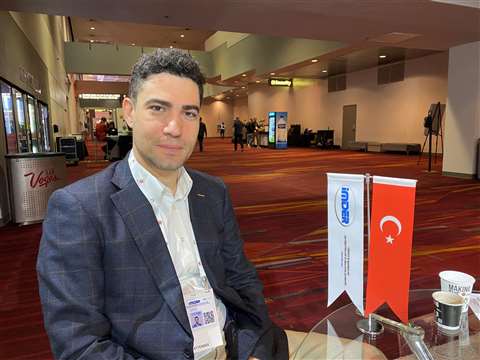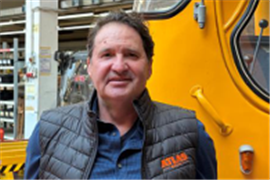How did Turkey’s construction equipment industry respond to the February earthquake?
12 April 2023
The secretary general of Turkey’s two main construction equipment associations, İMDER and İSDER, tells International Rental News (IRN) how the industry responded to the earthquakes in February.
Oğuz Yusuf Yiğit, secretary general of İMDER and İSDER, recalls very clearly the days following the 6 February earthquakes in Turkey and Syria.
“We received thousands of calls from people trying to find equipment to help in the rescue”, he says. It was traumatic for the staff involved because the callers were desperate for immediate help, looking for cranes and excavators to aid in the search operations.
 Oğuz Yusuf Yiğit , secretary general of IMDER and ISDER associations, pictured at ConExpo-Con/Agg. (Photo: IRN)
Oğuz Yusuf Yiğit , secretary general of IMDER and ISDER associations, pictured at ConExpo-Con/Agg. (Photo: IRN)
İMDER, which represents construction equipment manufacturers and distributors in Turkey, and İSDER, its sister organisation representing the rental and material handling sectors, did as much as they could to coordinate the industry and provide equipment.
“After the earthquake we immediately got calls from our members asking what we were doing”, says Oğuz, speaking to IRN at the ConExpo exhibition in Las Vegas, “Very quickly we had a board meeting and began communicating with AFAD [Turkey’s disaster relief body]. Of course, it was a big shock for all of us.
“Very quickly, on day one, our distributor and OEM members sent 60 machines to the region. It was difficult – there was no electricity in the impacted area, no phones, difficult to communicate.
“We managed to organise a big team, with local distributors who were able to provide equipment servicing. Service people from 150 companies were involved – they helped to keep the equipment going, 24/7, providing fuel, tyres, and other assistance.” İMDER companies ended up sending more than 300 machines to the affected areas.
10,000 machines in rescue
At the peak, says Oğuz, there were more than 10,000 machines involved in the rescue operation, and he thinks that IMDER and the equipment it supplied were directly involved in saving more than 250 lives.
“Thousands of people lost fathers, mothers, children, loved ones. It was a very emotional period for us, but we had to keep calm to help”, he says. “All of our members – OEMs, distributors, rental companies – gave their maximum to help.”
 Debris being removed at Hatay, Turkey on 7 April, two months after the earthquake. (Photo: Murat Kocabas/SOPA Images/Sipa USA via Reuters connect).
Debris being removed at Hatay, Turkey on 7 April, two months after the earthquake. (Photo: Murat Kocabas/SOPA Images/Sipa USA via Reuters connect).
The damage was widespread and profound, with an estimated 800,000 buildings damaged and 300,000 totally collapsed. More than 50,500 people lost their lives, and at least 107,000 injured. The region was home to around 14 million people – 16% of the Turkish population.
A massive rebuilding effort is now underway, and it will be a major, long-term project. “They are planning 85,000 new homes within one year, using fast construction techniques,” Oğuz says.
There will be an impact on Turkey’s construction equipment sector. İMDER thinks that sales of earthmoving equipment will increase by 10 to 15% this year to more than 12,000 units.
Oğuz thinks it will have another impact, in that contractor and rental-owned fleets of equipment will be seen as crucial assets in the event of future disasters.
Equipment fleets are important
“We understand much more now the importance of machinery fleets, whether held by rental companies or contractors”, he says, “It was the biggest disaster of the century for Turkey, and it underlined the importance of rental and equipment fleets.”
He says the organisation will hold a construction equipment and rental conference in Istanbul on 3 and 4 October this year, and that will include a discussion panel on disaster response.
“We want to get government agencies and NGOs with us, and demonstrate the resources of our members”, says Oğuz. “We never want to see it happen again, but if it does, we want to be more ready.”
There is something else that Oğuz remembers from February, the support from the international construction equipment community.
“We received many messages from partners who wanted to send help. We connected them to AFAD. We had many phone calls.
“It made us feel better - to know that we were not alone.”
- Note: Donations can be made to UNICEF’s Turkey-Syria earthquake appeal at this website.





